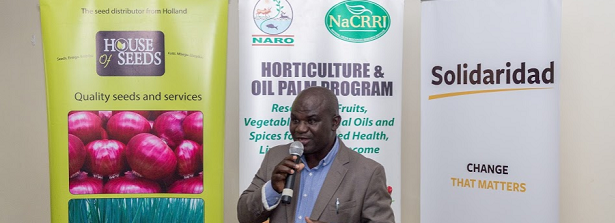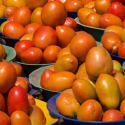ARF “Grafted Tomato” project launched in Uganda

The Applied Research Fund (ARF) project “Improved Resilience through Sustainable Production of Grafted Tomatoes in Uganda (IRESO)” was launched by Josephat Byaruhanga, Senior Policy Officer Agribusiness of the Embassy of the Kingdom of the Netherlands in Kampala. The launch took place on August 14, 2018, at the National Crops Resources Research Institute (NaCRRI) in Namulonge, Wakiso District in Uganda.
The conventional science grafting technology helps to respond to the negative effect of bacterial wilt in tomatoes caused by a soil borne pathogen (Ralstonia Solanacearum) through production of market desirable but susceptible varieties raised as scions on resistant varieties as rootstocks.
The screening of rootstocks that are resistant to the five races of bacterial wilt and related grafting is conducted by the Horticulture and Oil Palm program at the National Crops Resources Research Institute (NaCRRI), one of the institutes under the National Agricultural Research Organisation with mandate to carry out research on horticulture and oil palm, root crops, cereals and legumes.
Dr. Asea Godfrey, Director of Research at NaCRRI opined that this Public Private Partnership consortium project with partners from research (National Agricultural Research Organisation, Uganda -NARO), private sector (House of Seeds Limited and Enza Zaden), knowledge broker (AgriProFocus), Dutch development (lead partner, Solidaridad) and local farmers, is a step in the right direction to develop eventual Uganda Seed systems.
A total number of 500 youths selected from the project area will have their capacity built, receiving specialized knowledge and skills to manage well their young plant raiser nurseries as well as sell grafted tomato seedlings using seed from Enza Zaden and NaCRRI to 4,000 participating farmers in Wakiso, Mpigi, Luwero, Mukono and Kabale. Justus Twebaze, an independent business advisor will prepare the youths to form legally recognized investment clubs for financial inclusion and access to affordable credit facilities with the field level trade partner tripartite trustees who are willing to buy and package the produce within the project area for the local and regional markets.
This Grafted Tomato project contributes to Uganda’s aspirations for safe food, improved food security and nutrition and wealth creation under the policy direction of vision 2040. This also contributes to the Dutch policy goals of eradicating hunger and malnutrition, promoting inclusive and sustainable growth in the agricultural sector as well as creating ecologically sustainable food systems.
Mr. Josephat Byaruhanga, the Chief Guest, observed that the people of the Kingdom of the Netherlands through the Embassy in Kampala have supported the development of the seed sector in Uganda, innovative and ecologically friendly dairy industry, and the Dutch potato seed development with nine varieties approved and recommended for multiplication and planting in seven agro-ecological zones of Uganda. He proposed that the consortium, including knowledge broker AgriProFocus, ought to focus on mind-set change of the participating farmers to practice farming as a business.
This would call for farmer institutional development towards well-organized farmer organizations for economies of scale, collective marketing and bulk procurement of genuine inputs. He called for enabling policy environment to address and furthermore improve the sanitary and phytosanitary issues in the fruits and vegetables sub-sector of Uganda. He lauded the milestone of grafting and screening for resistant varieties akin to the success achieved by NARO on Cassava Mosaic Virus some years back. The Chief Guest challenged the consortium, including NARO, to translate and transfer the technology to the hands of the farmers and schools. He encouraged the Government of Uganda to invest more into research that answers the felt needs but also deepen basic research, knowledge and innovations.
The Chief Guest suggested to the Government of Uganda to invest in agricultural extension, packaging of information into formats that are easy to understand as the necessary linkage between research and the farmers. He proposed to the consortium to co-ordinate with Operation Wealth Creation, National Agricultural Advisory Services, and Skilling Youth for Employment such that the “Grafted Tomato” project will take off the ground at speed and scale. He mentioned that this project falls under the Embassy‘s priority of food security and productivity improvement. He challenged both the farmers and the youth participating in the project to aim high and compete in the ‘Best Farmers’ competition. This competition is in the fourth year running and the Embassy of the Kingdom of the Netherlands, DFCU, KLM and New Vision are amongst the sponsors.”
The Grafted Tomato project is implemented by a co-creation consortium of Solidaridad, National Agricultural Research Organisation (NARO), House of Seeds, Enza Zaden, Makerere University and AgriProFocus. It is funded by the Ministry of Foreign Affairs of the Netherlands through WOTRO, the Science for Global Development department of NWO (The Netherlands Organisation for Scientific Research), with lessons shared and disseminated by the Food & Business Knowledge Platform as well as AgriProFocus.






